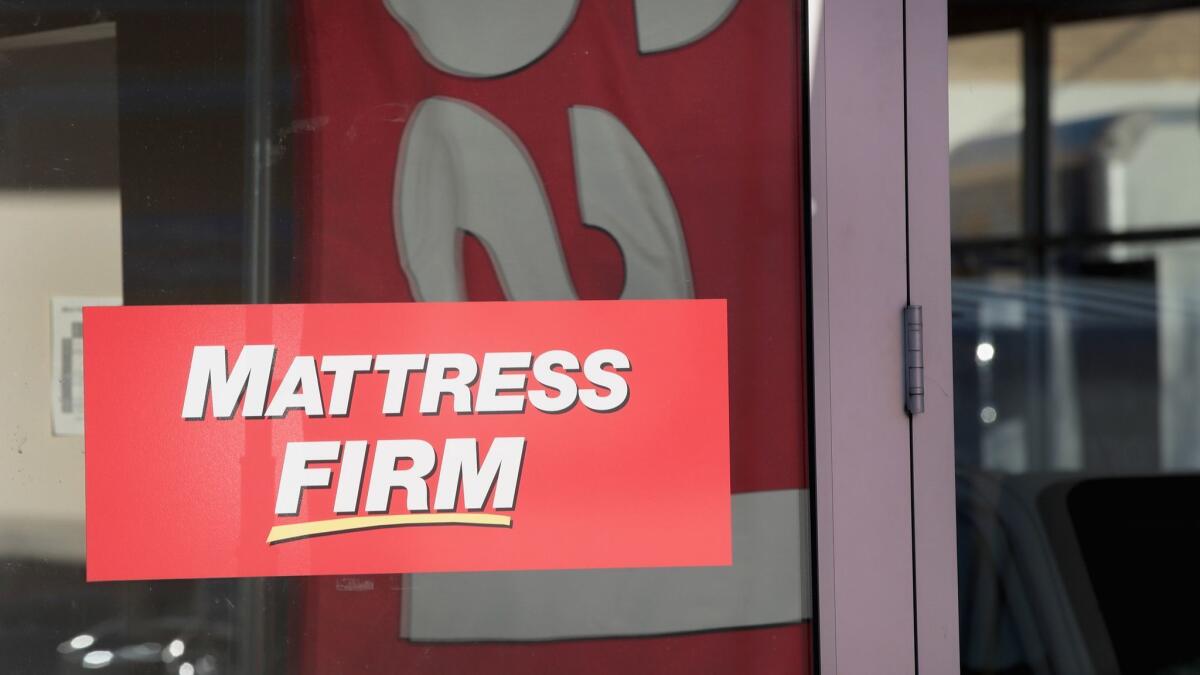‘A wake-up call for traditional mattress chains’: Mattress Firm files for bankruptcy

- Share via
Mattress Firm, the country’s largest mattress chain, filed for Chapter 11 bankruptcy protection Friday, becoming the latest retail chain to be brought low by online competition.
The Houston company, which has 3,400 locations nationwide, plans to close 200 stores in the coming days and as many as 700 by year’s end, according to its bankruptcy filing. The company said that it does not anticipate delayed deliveries and will keep paying its suppliers in full.
“Leading up to the holiday shopping season, we will exit up to 700 stores in certain markets where we have too many locations in close proximity to each other,” Steve Stagner, chief executive of Mattress Firm, said in a statement. He added that the company would use the money it saved from store closings to “improve our product offering, provide greater value to our customers and strategically expand in existing markets where we see the greatest opportunities to serve our customers.”
Mattress Firm is the latest in a string of national retailers, including Brookstone and Nine West, to file for bankruptcy as shoppers flock online. Founded in 1986, the company has long been a stronghold in the mattress industry. In 2015, it bought rival Sleepy’s for $780 million and announced plans to expand throughout the Northeast and Mid-Atlantic regions.
But analysts say the company had too many locations — and did too little to keep up with the crush of online competitors that are winning over shoppers with convenience and more transparent pricing.
“This is a wake-up call for traditional mattress chains: The 1960s model doesn’t work anymore,” said Bob Phibbs, chief executive of New York-based consultancy the Retail Doctor. “The traditional mattress-buying experience didn’t make people feel like they mattered. It made them feel used.”
In short, he said, buying a mattress often felt like buying a used car: Customers weren’t sure how to compare one model with another, and the barrage of promotions and discounts made them feel insecure about whether they were actually getting a good deal.
“The reality is that mattress companies have been ripe for disruption,” Phibbs said.
Mattress Firm’s bankruptcy filing came just days after Amazon.com announced it was getting into the online bed-in-a-box business, popularized in recent years by the likes of Casper, Tuft & Needle and Leesa. Walmart launched its own online premium mattress brand, Allswell, this year. The basic premise of each brand is the same: Buy a mattress online and try it at home. If you don’t like it, you get a full refund. (Jeff Bezos, the founder and chief executive of Amazon, also owns the Washington Post.)
Mattress Firm has had other woes, too: Last year it lost an important contract with Tempur Sealy International, and its parent company, Steinhoff International Holdings, has been mired in an accounting scandal.
“Between declining sales and over-expansion, it’s been a downhill battle for Mattress Firm,” said Stephanie Lieb, a bankruptcy attorney with Tampa, Fla.-based Trenam Law. “If consumers are going to a brick-and-mortar location, it’s because they want better service, not just a mattress.”
Bhattarai writes for the Washington Post.
More to Read
Inside the business of entertainment
The Wide Shot brings you news, analysis and insights on everything from streaming wars to production — and what it all means for the future.
You may occasionally receive promotional content from the Los Angeles Times.










